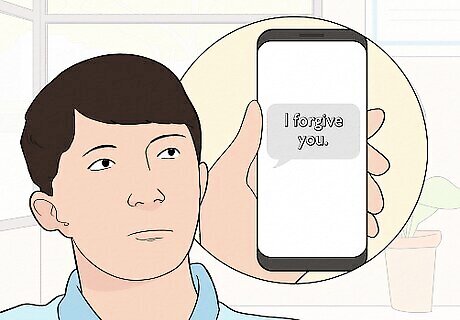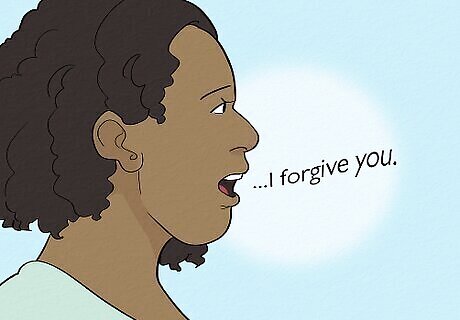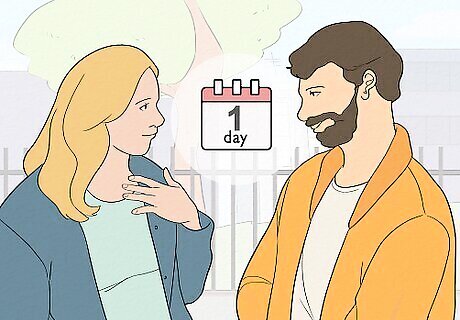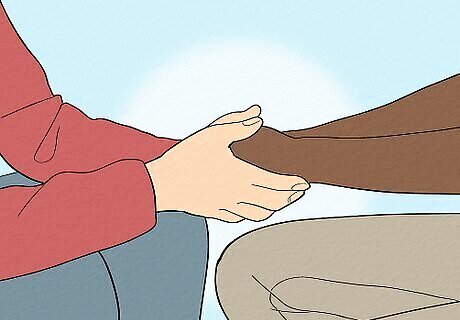
views
X
Trustworthy Source
American Psychological Association
Leading scientific and professional organization of licensed psychologists
Go to source
Forgiving someone who’s wronged you can be a difficult journey, but it’s been proven to help people live more fulfilling lives, reduce pain, and lower anxiety and blood pressure.[2]
X
Trustworthy Source
Johns Hopkins Medicine
Official resource database of the world-leading Johns Hopkins Hospital
Go to source
We spoke to marriage and family therapist Moshe Ratson to bring you the best advice on how to let go of grudges and be more forgiving.
Working Toward Forgiveness

Identify your feelings and emotions. Take a step back and think about how serious the situation is. How hurt are you? Is the act truly unforgivable, or is it something you won’t think about in a month? Acknowledge your pain and then examine it with the bigger picture to understand why you may be hurt. For instance, say your partner cheats on you. You may decide to end the relationship while still choosing to forgive them so you can move on with your life. As another example, maybe a friend made a negative comment about your looks. You may reflect on why the comment hurt you and what insecurity it triggered.

Think of the good in the relationship. Make a list of all the great things about the person who hurt you. Then, write down all the negatives. Compare the pros and cons—do the pros outweigh the cons? Do their good qualities outweigh what they did to hurt you?

Reflect on times when you were forgiven. You’ve likely been forgiven in the past. How did the other person make you feel when they forgave you? Did they say anything that stuck with you? Is there anything you can emulate if you chose to forgive someone who’s hurt you? Life is full of lessons, so use your past experiences to help you find peace. Think about how the other person forgave you. Did they talk to you in person or via text? Consider what they said and how it made you feel. Did you leave the conversation relieved or upset?

Let go of your resentment by accepting the situation. If you resent or hold a grudge against someone, you’ll likely have trouble continuing the relationship. Accept that what’s done is done. You may not have been able to control what happened to you, but you can control how you react to it. Try saying things like, “I am angry because they broke my trust, and I accept that this has happened,” and “I accept what has happened and how it made me feel.” Marriage and family therapist Moshe Ratson reminds us that “forgiveness is about moving from a position of blaming and being stuck, toward accepting the undesirable situation and empowering yourself to move forward.” It won't happen overnight, but the sooner you aim to let go of your resentment, the sooner it’ll become a priority. Focus on what you can do to move forward instead of focusing on the past.

Take some time to be alone with your thoughts. It can be difficult to decide whether or not you want to forgive someone and what that’ll mean for your relationship. It’s okay to take your time to think over the decision and process your emotions—do what’s best for you. If you’re in the heat of the situation, take a breather by going into the other room or taking a walk. Try some relaxation techniques, like meditation or deep-breathing, to calm your mind if you’re overwhelmed.

Talk to someone about the situation. If you’re upset about what happened, talking to someone else can help you gain a new perspective. Tell a friend, loved one, or therapist about why you’re feeling hurt or betrayed. They may be able to provide some guidance or help you see the situation in another light.
Talking to the Person

Take some time to think about what you want to say. Moshe Ratson, an experienced marriage and family therapist, recommends preparing what you want to say and how you want to say it before you start the conversation. Though you may be feeling bitter, angry, hurt, or confused, find a way to delicately state these emotions rather than exploding or saying something you don’t really mean. This can help you channel your thoughts and emotions while ensuring they’ll be clear to the other person. When you’ve decided on what you’ll say, think about how you’d feel if you were the other person. Would your words make you sad or hopeful? Try writing down exactly what you want to say (or practice in front of a mirror) to get it exactly how you want.

Express your feelings. Tell the other person how their actions made you feel with “I” statements. Focus on why you’re upset rather than blaming them (even if you believe they’re in the wrong). This way, you can try to avoid confrontation and let yourself be heard. For example, try saying, “I felt hurt when you cheated on me because I've been loyal and devoted, and I thought you felt the same way.” Be as honest as possible, expressing the pain you have been going through.

Practice empathy. Empathy helps you see another person’s perspective and build stronger relationships. Showing empathy to someone who’s hurt you can help you forgive them because it allows you to better understand their situation and why they may have hurt you. While their behavior may be inexcusable, having a caring heart can help you make amends and find peace. Practice empathy by: Actively listening when they talk. Asking follow-up questions if they say something you don’t understand. Making eye contact. Being more mindful when communicating.

Listen to their side of the story. As marriage and family therapist Moshe Ratson explains, “We must remember that each individual has the story of their life that led them to make the decisions they make.” There are always two sides to a coin. Hear the other person out and listen to what they have to say. Who knows? The situation may be a big misunderstanding, or they may feel awful about what happened! Give them a listening ear before you make a final decision.
Moving Forward

Take some time apart if you need it. Assess whether or not you need some physical time away from the person who hurt you. If you do, set boundaries with them. Let them know you need a few hours, days, or weeks away from them to clear your head and find forgiveness. Only return to the person or relationship when you’re ready—follow your heart and do what’s best for you in the moment.

Make a conscious decision to forgive them. Forgiveness can be easy for some people, and for others, it can be very difficult. But no matter how easy or difficult forgiveness is for you, it has to be a choice you make. If you decide to forgive, seal the deal with action—honor your word. Say you’ll forgive them out loud, and then follow through. This can look like trusting the person again or confiding in them. It’s okay if you’re not ready to forgive someone right away. Forgiveness can look different for everyone—there’s no set time frame.

Take small steps to mend your relationship. When and if you’re ready to move forward with the person, slowly ease back into the relationship. Things might not go back to normal right away, and that’s okay. Take it slow and do what you’re comfortable with. For instance, if it’s a romantic relationship, treat it like going on a first date. You don't have to hug, cuddle, or hold hands like you did before if you’re not ready to.

Let go and learn from the past. Avoid dwelling on the past as you move forward with your relationship. Continuing to think about the past will limit your trust in the person, leading to a stifled relationship. You don’t necessarily have to “forgive and forget,” but use the past as a lesson. What can you (and the person who hurt you) learn from the experience? If a negative comment triggered you, think about how you can stand up for yourself in the future now that you know why the comment bothers you. If you catch yourself dwelling on the past, focus on the present moment instead by noticing what’s around you, what you smell, and what you can hear.

Forgive and love yourself. Marriage and family therapist Moshe Ratson suggests that the best thing you can do is forgive yourself. You are lovable. You are capable. You are forgivable. Focus on caring for yourself during hard times. Giving yourself a hug is sometimes the best medicine. Indulge in some self-care to ease your mind and love yourself. Take a bubble bath, buy a new book, or treat yourself to a fancy dessert. Read a self-help book to learn more ways to forgive and love yourself. Try journaling to discover more things about yourself and process your thoughts. Know that you can’t change what happened, but you can forgive and love yourself moving forward.
What are the benefits of forgiveness?

Forgiveness can reduce stress, anxiety, and blood pressure. Studies have shown that making a conscious effort to forgive others can help relieve pain, minimize anxiety and stress, and lower blood pressure. On top of this, those who live more forgiving lives are proven to be more satisfied with their lives and experience fewer stress-related health issues.




















Comments
0 comment